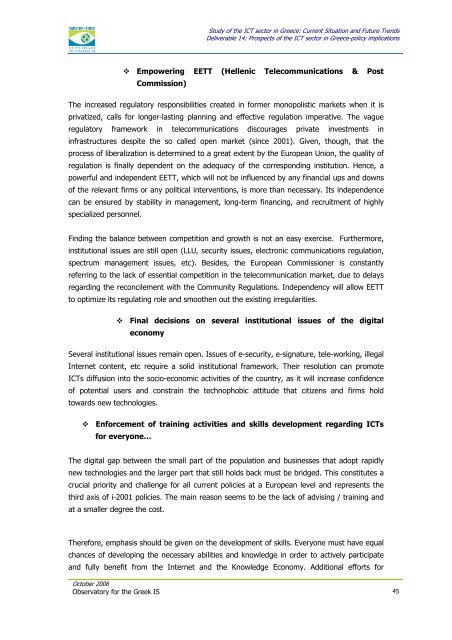Prospects of the ICT sector in Greece
Prospects of the ICT sector in Greece
Prospects of the ICT sector in Greece
- No tags were found...
You also want an ePaper? Increase the reach of your titles
YUMPU automatically turns print PDFs into web optimized ePapers that Google loves.
Study <strong>of</strong> <strong>the</strong> <strong>ICT</strong> <strong>sector</strong> <strong>in</strong> <strong>Greece</strong>: Current Situation and Future Trends<br />
Deliverable 14: <strong>Prospects</strong> <strong>of</strong> <strong>the</strong> <strong>ICT</strong> <strong>sector</strong> <strong>in</strong> <strong>Greece</strong>-policy implications<br />
Empower<strong>in</strong>g EETT (Hellenic Telecommunications & Post<br />
Commission)<br />
The <strong>in</strong>creased regulatory responsibilities created <strong>in</strong> former monopolistic markets when it is<br />
privatized, calls for longer-last<strong>in</strong>g plann<strong>in</strong>g and effective regulation imperative. The vague<br />
regulatory framework <strong>in</strong> telecommunications discourages private <strong>in</strong>vestments <strong>in</strong><br />
<strong>in</strong>frastructures despite <strong>the</strong> so called open market (s<strong>in</strong>ce 2001). Given, though, that <strong>the</strong><br />
process <strong>of</strong> liberalization is determ<strong>in</strong>ed to a great extent by <strong>the</strong> European Union, <strong>the</strong> quality <strong>of</strong><br />
regulation is f<strong>in</strong>ally dependent on <strong>the</strong> adequacy <strong>of</strong> <strong>the</strong> correspond<strong>in</strong>g <strong>in</strong>stitution. Hence, a<br />
powerful and <strong>in</strong>dependent EETT, which will not be <strong>in</strong>fluenced by any f<strong>in</strong>ancial ups and downs<br />
<strong>of</strong> <strong>the</strong> relevant firms or any political <strong>in</strong>terventions, is more than necessary. Its <strong>in</strong>dependence<br />
can be ensured by stability <strong>in</strong> management, long-term f<strong>in</strong>anc<strong>in</strong>g, and recruitment <strong>of</strong> highly<br />
specialized personnel.<br />
F<strong>in</strong>d<strong>in</strong>g <strong>the</strong> balance between competition and growth is not an easy exercise. Fur<strong>the</strong>rmore,<br />
<strong>in</strong>stitutional issues are still open (LLU, security issues, electronic communications regulation,<br />
spectrum management issues, etc). Besides, <strong>the</strong> European Commissioner is constantly<br />
referr<strong>in</strong>g to <strong>the</strong> lack <strong>of</strong> essential competition <strong>in</strong> <strong>the</strong> telecommunication market, due to delays<br />
regard<strong>in</strong>g <strong>the</strong> reconcilement with <strong>the</strong> Community Regulations. Independency will allow EETT<br />
to optimize its regulat<strong>in</strong>g role and smoo<strong>the</strong>n out <strong>the</strong> exist<strong>in</strong>g irregularities.<br />
F<strong>in</strong>al decisions on several <strong>in</strong>stitutional issues <strong>of</strong> <strong>the</strong> digital<br />
economy<br />
Several <strong>in</strong>stitutional issues rema<strong>in</strong> open. Issues <strong>of</strong> e-security, e-signature, tele-work<strong>in</strong>g, illegal<br />
Internet content, etc require a solid <strong>in</strong>stitutional framework. Their resolution can promote<br />
<strong>ICT</strong>s diffusion <strong>in</strong>to <strong>the</strong> socio-economic activities <strong>of</strong> <strong>the</strong> country, as it will <strong>in</strong>crease confidence<br />
<strong>of</strong> potential users and constra<strong>in</strong> <strong>the</strong> technophobic attitude that citizens and firms hold<br />
towards new technologies.<br />
Enforcement <strong>of</strong> tra<strong>in</strong><strong>in</strong>g activities and skills development regard<strong>in</strong>g <strong>ICT</strong>s<br />
for everyone…<br />
The digital gap between <strong>the</strong> small part <strong>of</strong> <strong>the</strong> population and bus<strong>in</strong>esses that adopt rapidly<br />
new technologies and <strong>the</strong> larger part that still holds back must be bridged. This constitutes a<br />
crucial priority and challenge for all current policies at a European level and represents <strong>the</strong><br />
third axis <strong>of</strong> i-2001 policies. The ma<strong>in</strong> reason seems to be <strong>the</strong> lack <strong>of</strong> advis<strong>in</strong>g / tra<strong>in</strong><strong>in</strong>g and<br />
at a smaller degree <strong>the</strong> cost.<br />
Therefore, emphasis should be given on <strong>the</strong> development <strong>of</strong> skills. Everyone must have equal<br />
chances <strong>of</strong> develop<strong>in</strong>g <strong>the</strong> necessary abilities and knowledge <strong>in</strong> order to actively participate<br />
and fully benefit from <strong>the</strong> Internet and <strong>the</strong> Knowledge Economy. Additional efforts for<br />
October 2006<br />
Observatory for <strong>the</strong> Greek IS 45
















